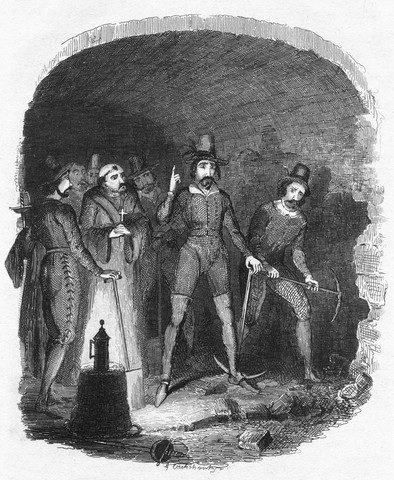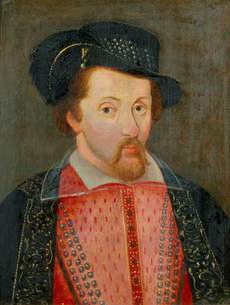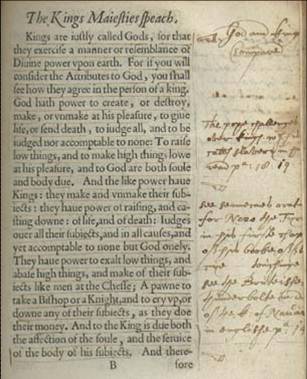The Whig and Marxist
Point of View
Claim: The English Civil War was Inevitable, the result of a Long-Term Constitutional Crisis, and the Fault of King James I
Let’s start with the basics. What is a “Whig”? It has nothing to do with a fake hair piece. Traditionally, a “Whig” is someone who supports British Parliament (their version of Congress), and who, traditionally, wants a more limited version of a monarch. They tend to see Parliament as associated with “freedom” and the monarch as one who wants to “thwart” freedoms. The Whig Historians tend to see King James I as the “chief cause” of the English Civil War, and if it’s not James, then its centuries of monarchical decay. In sum, they see the Civil War as an inevitable event and focus on long-term issues. The Marxists tend to agree that it was, in fact, a "class struggle", but more of an economic one. In sum, it was the result of centuries of financial mismanagement.
Let's expand upon both of these viewpoints.
Let's expand upon both of these viewpoints.
|
Let’s start with their chief argument: James I was the blame. As we know, James I was Scottish birth, was abandoned by his mother, raised by Scottish nobility, and assumed the throne in 1603 after the death of Elizabeth I. First point of problem: James was born a Scottish Catholic, but adopted the Calvinist faith. So, right away we’ll see religion as a chief “problem” with James.
As King, James had three (3) religious aims: achieve a “religious balance” between Protestants and Catholics, provide increased protection and toleration to the Catholics, and convince the Catholic bishops to support him. |
In 1611, James succeeded in creating the King James Bible, complete with a more modern translation, and made available to the masses. James knew he had to cater to his Catholic bloodline, even if he wasn’t Catholic himself. In fact, under the last 17 years of Elizabeth’s reign, 146 Catholic priests were executed. During his reign as king, Catholic “terrorists” wage war on their Calvinist king: once in 1603 during an event known as the Bye Plot, and again in 1605 with an infamous attempt to blow up the Houses of Parliament. A man named Guy Fawkes is memorialized with the short poem: “Remember, remember the Fifth of November, the gunpowder, treason, and plot. I know of no reason why the gunpowder treason should ever be forgot.” He failed in his endeavours and was killed for his efforts in the treasonous Gunpowder Plot. After this episode, Catholics were forbidden to live in the city of London. By 1606, Catholics were forced to take the “Oath of Allegiance”, forswearing their religion, committing to the British law, denying the Pope’s power to depose the king.
|
If James couldn’t succeed religiously, perhaps he could succeed politically. Declaring himself the “King of Great Britain” (and not England or Scotland), James attempted to unite the British territories by pushing Parliament to recognize a full union between England and Scotland. Parliament blocked the Union twice, once in 1604 and again in 1607. Put simply, no Englishman, or Scotsman, wanted to be united with the other. Scotland would not become part of Great Britain for another century.
So…we’re “0 for 2”: can’t solve religion and can’t solve politics. But, maybe he can solve economics? The chief issues of the time were taxation and royal extravagance. In 1610, Parliament criticized the king for his extravagant expenditure on the royal household. In 1611, James would “dissolve” Parliament to show his disgust and wouldn’t “call” them again until 1621. But they had a point: James’ financial requests were egregious: Around this same time, the king asked parliament pay for his eldest son’s (Henry’s) funeral and the costs of his daughter’s marriage. The 1608 “Book of Bounty” as it was called was supposed to limit royal expenditures, but it failed. By 1610, expenditures on the royal household had doubled. Between 1606 and 1610, James only received one Parliamentary grant of funding, which amounted to under £100,000.
But the "money problems" start way before James. And this is where the Marxists make their claim. Let's examine some economic data:
So…we’re “0 for 2”: can’t solve religion and can’t solve politics. But, maybe he can solve economics? The chief issues of the time were taxation and royal extravagance. In 1610, Parliament criticized the king for his extravagant expenditure on the royal household. In 1611, James would “dissolve” Parliament to show his disgust and wouldn’t “call” them again until 1621. But they had a point: James’ financial requests were egregious: Around this same time, the king asked parliament pay for his eldest son’s (Henry’s) funeral and the costs of his daughter’s marriage. The 1608 “Book of Bounty” as it was called was supposed to limit royal expenditures, but it failed. By 1610, expenditures on the royal household had doubled. Between 1606 and 1610, James only received one Parliamentary grant of funding, which amounted to under £100,000.
But the "money problems" start way before James. And this is where the Marxists make their claim. Let's examine some economic data:
- Between 1500 and 1640, food prices increased by 8 times, whereas wages only increased by 3 times.
- When Elizabeth I died in 1603, the "estimated debt left" by her administration totaled between £100,000-£400,000 with only £90,000 left in the Treasury...
- Intensive wars with Spain had further bankrupted the Crown...
|
Still, James retained his “divine inspiration”. In his own words:
|
So…can you see why James was the cause of the Civil War? He didn’t fix the religious problems, couldn’t unite the empire, and spent extravagantly! Case closed! If you’re still having trouble, examine the quotes of some of these historians:
- “At the very moment at which a republican spirit began to manifest itself strongly in parliament and in the country, the claims of the monarch took a monstrous form. James…enraged and alarmed parliament by constantly telling them that they held their privileges merely at his pleasure”. (Thomas Macaulay, 1848)
- “He had no concept of the importance of sea power. He…utterly neglected the navy… James’ peaceful policy was put to a cruel test by the Outbreak of the Thirty Years War…(George Trevelyan, The History Of England, 1926)
- There is no evidence at all that he ever considered…the true interests of England or Protestantism…(Godfrey Davies, The Early Stuarts, 1603-1660, 1959)



